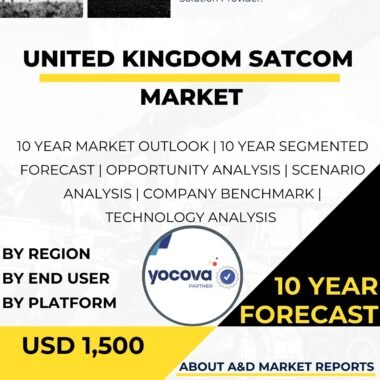Description
Brazil SATCOM Market: Powering Connectivity and Resilience
Brazil SATCOM Market fuels progress in defense, telecommunications, and space sectors, delivering vital communication solutions across its vast territories. Satellite Communication (SATCOM) harnesses geostationary and low-earth orbit satellites to provide secure voice, data, and video transmission, even in remote regions. Brazil strengthens its defense infrastructure and expands telecommunications access, making SATCOM a strategic priority.
The market thrives as Brazil enhances its communication network to connect its 8.5 million square kilometers, including remote areas like the Amazon. SATCOM ensures reliable connectivity, reaching underserved communities where traditional networks struggle.
Brazil’s defense forces drive market growth by demanding advanced SATCOM systems. The technology enables real-time communication and coordination among military branches, boosting mission success. Initiatives like the Geostationary Defense and Strategic Communications Satellite (SGDC) fortify defense operations.
Brazil pursues technological self-reliance, propelling the SATCOM market. By developing domestic infrastructure, the nation reduces reliance on foreign suppliers, aiming for global leadership. The SGDC-1, launched by Visiona Tecnologia Espacial and Telebras, secures robust communication networks.
SATCOM’s role in disaster management accelerates market expansion. Facing floods and wildfires, Brazil relies on SATCOM’s mobile solutions to coordinate relief efforts and maintain connectivity during crises, supporting the Brazilian Civil Defense.
In defense, SATCOM delivers encrypted communication for military units and command centers, enhancing operational effectiveness. In telecommunications, it extends broadband to remote areas, supporting programs like Amazônia Conectada. In the space sector, SATCOM facilitates data transmission for earth observation and weather forecasting, advancing Brazil’s space ambitions through the Brazilian Space Agency.
The market anticipates robust growth, fueled by the National Broadband Plan and private sector players like Viasat and Starlink. Investments in R&D and partnerships will address challenges, ensuring SATCOM strengthens Brazil’s connectivity and security.
In conclusion, Brazil’s SATCOM Market transforms communication, defense, and space capabilities. By providing reliable solutions in challenging terrains, it supports technological self-reliance and disaster response. Overcoming cost, regulatory, and bandwidth challenges will unlock SATCOM’s potential, solidifying Brazil’s role in global satellite communication.




